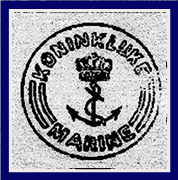
DUTCH INDONESIAN MEMOIRS 1941 - 1948
MLD Marine Luchtvaart Dienst
or
DNAS Dutch Naval Air Service
KONINKLIJKE LUCHTMACHT Netherlands Royal Air Force
HANGER 6 Naval Airstation Morokrembangan
Page 4. Anywhere and Everywhere but Home
In March 1945 I received orders to report back to headquarters in London and upon arrival was told that I was transferred back to the Naval Air Force. I reported to a British Navy training camp to finish aviation training. This was great, no more torpedo attacks or burning ships, no more sea watches, just rest, classes, and an easy life.
My class consisted of four Dutch, ten English, and two Polish sailors. August 1945, we passed our final exams and were now full-fledged technicians with the rank of petty officer first class, and I was to report to 860 allied squadron Royal Netherlands Navy, but not before we all went ashore and tanked up and got drunk. Everybody got two weeks leave to go home, and I went with a friend of mine Jan Hofman to his home in Helmond. This was the first time in my life that I set foot in Holland, everything except the language was strange, l had no family here but we had a good time.
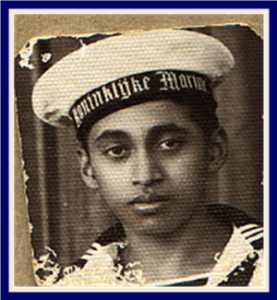
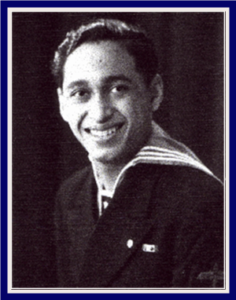
Frank Rugebregt 1941 Frank Rugebregt 1945
Jan's family was really nice to me and I was accepted in their home j ust as normal. Jan had a widowed mother and two sisters Nel and Lenie Hofman. In 1994 I met Jan again after 45 years on a navy veteran's reunion in Holland. We met again at our 50th year class reunion, in 1995 that was the last time I saw him. Jan Hofman passed away on January 29th, 1997.
August 5,1945 the Netherlands East Indies were liberated from Japanese occupation, and I anxiously waited for some sign from home and orders to sail home. Soekarno proclaimed the Republic of Indonesia and started the uprising. The Dutch tried to quell the terrorist attacks and to restore law and peace and pretty soon were involved in several police actions that would last until August 1950. As it turned out it would not be until October 1949 before I finally was to return and was reunited with my parents.
It was at this point that I believe Frank and my father's paths once again crossed. 860 squadron "O" flight having just returned from convoy duty aboard HNMS Gadilla. It was after this voyage that "O" flight was renamed "F" flight.
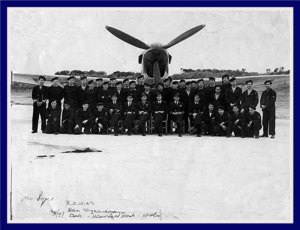
860 Squadron just before it sailed and 861 Squadron was formed with the Fairey Firefly MkIV.
My father Robert (Robbie) Hartman Kok Stood far right
Photograph copyright Ray Hartman Kok no duplication without consent.
Upon return I was assigned to 860 Squadron stationed in Inverness, Scotland and I settled into a long wait to sail home. The war was over and 860 squadron was slated to go to Indonesia, but I was not to go with them as it turned out later. The whole squadron transferred to St. Meryn, Cornwall, on the southern part of England and awaited transfer. The squadron was outfitted with extra rockets and bomb racks, and we waited for carrier assignment.
The squadron was assigned to Surabaja Naval Air Station "Morokrembangan", but not for several others and me.
Orders came that the squadron was to be split and those who stayed behind were to form a new squadron. I was to stay and all those who were born in Indonesia from mixed blood and all full-blooded Indonesians were to stay in England to form a "training squadron" and were sent to Pembroke, South Wales. Politics or what, l did not know. The fact was that we did not sail home. About 90 % of the crew, including officer pilots, left for South Wales. There were only a few "pure" Dutchmen, the commanding officer and three crew chiefs remained.
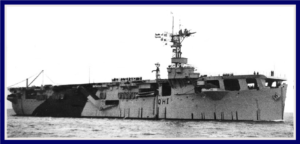
HMS Nairana. Loaned to the D.N.A.S was renamed HNLMS Karel Doorman (QH-I) sailed for Indonesia.
All of us have been in the service since WW II started and had family in Indonesia. Needless to say how I felt, very depressed and angry. Here I did my duty all those years and this was my reward? I realised that there was trouble at home. Communist uprisings for independence under Soekarno but why shouldn't we go home. In all those years I did not hear a word from home and by now I was getting pretty frustrated and to top it off I was denied my right to go home after four years of uncertainty. Around Christmas I went to the chapel and talked to a priest to seek counsel but all he could tell me was to be patient and that the Lord would take care of me in his own way but in the meantime I must not lose my faith. He was a British fleet chaplain, but I didn't mind as I had to talk to someone, but it didn't help much I just thought that he didn't fully understand my problem.
We celebrated Christmas 1946 in Wales waiting for orders to sail home and on February 21st, 1947, the squadron threw a party to celebrate the birth of the Royal Child, born to HRH Princess Juliana and HRH Prince Bernhard of the Netherlands.
The new squadron we formed now had new young airmen and we got busy getting the squadron in shape, but it was no fun anymore. Wales was a pretty dull place, and Milford Haven was the nearest town; it was a twenty-minute bus ride from camp. I went to town about once a week on Saturday when the town returned to life a little bit, as all the farmers and shepherds turned up in the pubs to drink their worries away silently. So why not? I joined them and for many hours drank in total silence until towards closing time the drunks start singing some Gaelic songs, which I didn't understand. Big fun....!!
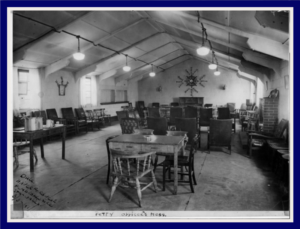
861 Squadron, Petty Officers Mess. Dale, Haverford West, Wales, 3 March 1947
Photograph copyright Ray Hartman Kok. No duplication without consent.
In March 1945 I received my first letter from Indonesia from the uncle where I grew up and who was in the Army Air Force. In the letter he wrote me that my parents where coming out of prison were they were held by rebellious troops, after being released by the Japs and enclosed was a post card from my father. The post card was six months old and was sent via the International Red Cross to Australia and a cousin who worked for the embassy and had the same last name, sent it to his father to forward it to the Dept. of the Navy in Surabaya. There were just a few words on the postcard saying that he was fine and that the Red Cross had notified him that I was in Australia. My father's first notification from the Red Cross was in the beginning of the war in 1942, stating that I was killed in action.
Time passed and 861 squadron transferred to Holland and this was the second time in my life that I was in Holland. This was home coming to the mother country. The squadron was stationed on "Valkenburg" a Dutch Naval Air station near the Hague, and I was now considered a war veteran eligible for an accumulated leave of ninety days. But there was no hometown or home to come home to, so I went to an R&R centre in Doorn. The navy ran the centre and I met a lot of my old buddies there who were in the same situation as I was, no home no family. We were totally free and could come and go as we pleased. Meals were served at regular navy times, the only difference was that we had tablecloths and place settings and you were served. I spent most of the day loafing around and stepping out at night I had plenty of money, as I was paid retroactive combat pay and generally I blew it on booze and eating out. A group of us used to go out together and hit the town of Utrecht during weeknights. There was always a nightspot that was lively.
One day my luck broke. It was one of those nights that I decided to go dancing before boozing, when I met a girl who was to become my wife. It was love at first sight and I stayed till closing time. When we parted, we made a date for the next evening, and I went straight back to camp!!
My vacation ran out and so did my money, but I now had a girl, her name was Willy Buys. She took me to her home to meet the family and from then on, I led a serious life, no more booze and wild bar parties. I went back to my base and spent the weekends when I was off duty at her house.
By now I had received a letter from home and my father and mother were out of prison and were safe with family in Jakarta. I wrote them about my girl and told them that I was planning to marry her, and they gave me their blessing, only regretted that they could not be at the wedding but were sure that I soon would be home.
We were married on April 28th, 1948, in Utrecht; I stopped drinking, loved her, trusted her and respected her to this day.
I was now six years from home, five of them without any contact with my family.
A new episode started in my life.
Indonesia was in turmoil in 1945. It proclaimed its independence with Soekarno as president. Rebel uprisings and freedom fighting raged the country and the Dutch had launched a police action in late 1947 but the fighting continued against the rebel forces of the self-proclaimed president Soekarno.
September 1948, I was assigned to my old squadron in Surabaya and with three other men I left by air for Jakarta and then on to Surabaya, to the old Naval Air Station "Morokrembangan." I had come full circle after nearly seven years, three years after the end of World War II. It is impossible to describe my feelings when I stepped out of the plane and set foot at home base. All I wanted now was to go home and see my parents. My parents in the meantime moved to Situbondo a small town just outside Pasuruan on a sugar plantation "Olean" where my father had a job as head of security.
A second police action was about to start, and I had a hard time to obtain a pass to see my parents. The Navy claimed that I had used all my active combat leave in Holland and that for this year I had no more leave coming. Finally, after several requests, my division officer said that he would talk to the commander in my favour and explain the whole situation. Three days later I had a pass for two weeks leave and a train ticket round trip to Pasuruan. I checked out a weapon at the armoury. That night I could hardly sleep and at four in the morning I left camp. A jeep drove me to the railroad station and at five-thirty the train took off, crowded with hardly a space left. On every car were marine guards or army MP's and I think that on the four-hour journey my pass and ID must have been checked twenty times and my weekend bag searched.
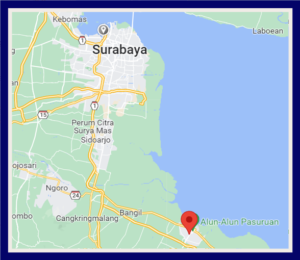
Morokrembangan Surabaja (marked) to Pasuran
At eleven I arrived in Pasuruan and of course nobody was there so I went into the stationmaster's office and asked him how I could contact the sugar plantation "Olean" at Situbondo. The man looked at me first because I addressed him in Indonesian, but when he noticed my uniform hurried to the phone and started to do some rapid dialling and shouting acts and in no time, I was connected with the plantation's switch board, and I asked them to contact my parents and tell them that I was at the train station. After about five minutes there was a phone call for me, and it was one of the administrative employees who spoke to me in Dutch and told me that my parents were under way and would be there in fifteen minutes. The station master offered me a seat and a cup of tea and asked me if I was going home and how long it was since I had been home. He could not believe that I was gone for so long and that I had been all over the world. A jeep pulling up interrupted our chat and I saw my parents in it. I don't remember what I said or did only that I embraced both of them and my parents kept saying "eindelijk, eindelijk', what meant "finally, finally..." My mother took my hand, and didn't let go of it, even in the jeep. She hung onto me, told my father to sit in front and I had to sit in the back with her still clutching my hand. When we arrived home she took me by the hand and led me in the house.
It was October 5th, 1948, two days before my parent's birthday; I was finally home after seven years and two months of separation. It was good to be home!
This was two months before my 23rd birthday. I had left before my 16th birthday and four years after the war ended and seven years of waiting and hoping to see my parents again, I was finally home. I told my parents that I was trying to get my wife to Indonesia and that she could come over if I signed a new contract for three years, my present contract had expired, and I was on draft status. In November 1948, my father had asked me if I could have a look at our house in Kamal, Madura. The land was still his, but he had not been back there after the war. I asked one of my buddies if he would come with me. We took the ferry to Madura, the same ferry I used to ride to go to school, even one of the deckhands was still there and I started talking with him and he recognised me then. He told me also that several families were imprisoned by the Japanese and had never returned.
When we came to our house, I was shocked by what I saw. The land was overgrown with weeds and wild vegetation; not one of the orange trees was alive. It was a mess, and the house was totally stripped of wood and metal. It was terrible only the stone walls were standing up. The roof and every bit of metal and wood were stripped. The well was still there but the metal structure that held the metal roof up was gone, so was the pulley.
A young woman was drawing water out the well and when I told her who I was, she said that she remembered me, and she pointed at the thatched hut where she lived and said that her mother was Boh Tigen and that she remembered me. I went with her to the hut and talked to her mother who immediately recognised me. She told me that during the occupation some Japanese officers moved in after my parents had left. They (the Japanese officers) had lived there for about two months and had moved out leaving everything behind and that later people from the neighbouring hamlets had come and had helped themselves to everything that was left. But she assured me that not she or her late husband nor her son had anything to do with it sure! The young woman was her daughter Satima and was now married, I vaguely remembered her, and she must have been about six years younger than I was. I went back to the house or what was left of it. I stood on the roofless veranda looking at the harbour of Surabaya like I used to do before the war, and I felt a sudden rage come up in me and it lingered for a few minutes and then subsided to make place for an indescribable wave of sadness.
The woman, Boh Tigen, asked me then if I could give her written permission to cut the brush for firewood and I wrote her a "surat" letter of permission. My buddy and I went back to camp. What a horrible day it was. The hardest part was to let my parents know what I had found and later I wished that I had never done it.
In June 1949 Willy arrived and we settled down in a private home and were as happy as can be. Willy became pregnant and on February 25th, 1950, at 11:45 PM, our first son was born in the Naval Hospital in Surabaya. We named him Johannes Karel Ferdinand (John) Rugebregt.
August 1950, Indonesia ceased to be a Dutch colony and was accepted as a sovereign nation. The Dutch flag came down in front of city hall and the Indonesian flag was raised. This was the end of a Dutch colonial era, which had lasted for three hundred years.
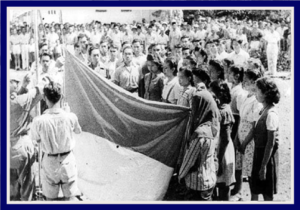
Raising the Indonesian flag. 17 August 1945. Sovereignty transferred 27 December 1949.
Republic of Indonesia announced on 17 August 1950
The Dutch Military forces were on inactive status and some units stayed only as military advisers. The rest was waiting transfer back to the Netherlands.
I was called to the commander's office and was told that I had two choices:
1. I could stay in the Navy and return to Holland
or
2. I could go over to the Indonesian National Navy and become "warga negara', or "changed Indonesian citizen". This was because I was of mixed blood (Indo-Europeans). All of us of mixed blood were told individually. The full-blooded Indonesian personnel was if they so desired discharged upon arrival in Indonesia.
This was a political ploy from both sides. Indonesia looked at us who had served the Dutch military forces as pariahs and unwelcome traitors to Indonesia, but they could use our expertise. Holland was overpopulated but owed us for fighting for her freedom as well, and could not cast us aside.
I felt like a son thrown out of the house and never to come back.
"Return to the Mother Country"
So, in October 1950 we boarded a troopship the "Sibajak" and sailed to Holland and to this day I have never set foot in Indonesia. I can't describe the feelings I had when we cast off, no regrets or sorrow or anger but certainly no joy. It is more sadness, which seems to grow stronger the older I get. My thoughts went back to that day in March 1942 when we caste of not knowing where we were going or what our future would be. But this time it was different as now I was not alone; I had a family.
I made my choice and have never regretted the decision. The love for my wife and child was stronger than the ties to my birthplace.
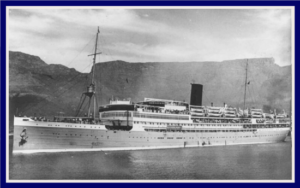
The Sibajak
A chapter in my life came to an end, and I was to start a new one in a new homeland but this time not alone. I had a strong wife to help and understand me, a son to cherish and a new life lay ahead of us. I had plenty of time to think about it on our journey back to Holland on board of that troop transport and I did. I had three more years to do in the navy because I signed that contract, and I traded palm trees and sunshine for snow and ice but also a good wife and a strong son.
I only hoped that my parents could follow soon as they too were to make the same decision I was faced with and so did thousands of people of mixed blood who had never seen Holland. They were not only service men but civilians too.
I did not have the desire to return to my birthplace and have not been back yet.
I have found peace with myself.
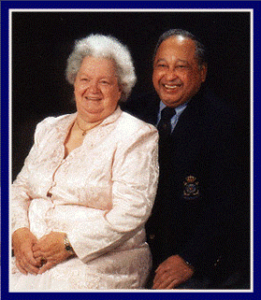
CELEBRATING 50 YEARS OF MARRIAGE IN 1998
FRANK & WILLY RUGEBREGT
I first published Frank's memoirs that he sent me and allowed me to tell them in 1995.
In 1999 Frank published his own Web page. In them he expands on his life and family in California.
You can continue his memoirs at:
http://www.rugebregt.com/frank/MyStory-Frank_Rugebregt.htm
I will be forever grateful to him for telling part of my father Robert (Robbie) Hartman Kok experiences.